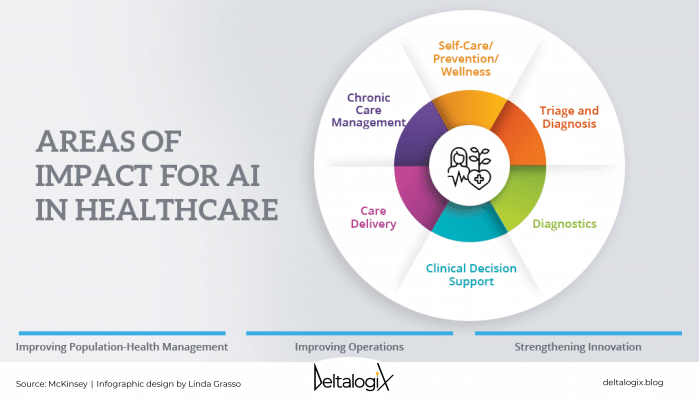
AI’s Transformative Impact on Healthcare: From Diagnosis to TreatmentAI’s Transformative Impact on Healthcare: From Diagnosis to Treatment Artificial intelligence (AI) is revolutionizing the healthcare industry, transforming every aspect from diagnosis to treatment. Here are some key ways AI is shaping the future of healthcare: Enhanced Diagnosis: * AI algorithms can analyze vast amounts of medical data, including electronic health records, lab results, and imaging scans, to identify patterns and make accurate diagnoses. * Machine learning models can assist clinicians in detecting diseases earlier and more precisely, leading to timely interventions and improved patient outcomes. Personalized Treatment Plans: * AI can generate individualized treatment plans based on a patient’s unique characteristics. * By considering factors such as medical history, genetic profile, and lifestyle habits, AI helps healthcare providers tailor treatments to maximize their effectiveness. Drug Discovery and Development: * AI can accelerate the discovery of new drugs and therapies by analyzing molecular structures, predicting drug interactions, and simulating clinical trials. * This reduces the time and cost of drug development, potentially bringing innovative treatments to patients sooner. Surgical Assistance: * AI-powered robotic systems assist surgeons during complex procedures, providing enhanced precision and dexterity. * These systems can perform minimally invasive surgery with increased accuracy, resulting in faster recovery times and reduced complications. Patient Monitoring and Management: * AI algorithms can continuously monitor patient health data, such as vital signs and medication adherence. * They can detect anomalies and trigger alerts, enabling timely interventions and proactive healthcare management. Telemedicine and Virtual Health: * AI-powered virtual health tools allow patients to access healthcare remotely through videoconferencing, chatbots, and symptom checkers. * This expands access to care, particularly in underserved areas or for patients with limited mobility. Cost Reduction and Efficiency: * AI can automate administrative tasks, streamline workflows, and reduce paperwork. * By improving efficiency, AI helps healthcare organizations save time and resources, which can be redirected towards patient care. Future Outlook: As AI technology continues to advance, its impact on healthcare is expected to grow even more profound. Some emerging applications include: * AI-powered prosthetics that enhance mobility and functionality for patients with disabilities. * AI-assisted mental health diagnosis and treatment, providing personalized support and reducing stigma. * Precision medicine using AI to tailor therapies based on a patient’s genetic makeup and disease progression. AI’s transformative impact on healthcare has the potential to revolutionize the way we diagnose, treat, and manage diseases. By harnessing the power of AI, healthcare providers can deliver more accurate, personalized, and efficient care to patients, ultimately improving their health outcomes and well-being.
Posted inNews